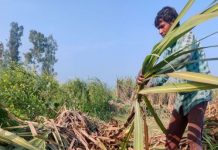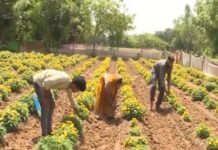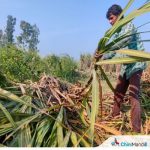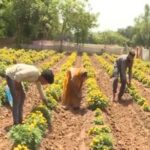Forward-looking sugar mills in the country are adopting sustainability as a key strategy to drive their operations and honour their green pledge. The industry which faces criticism for being a water guzzler, is challenging the very notion and emerging as a champion of water conservation. A prime example is Balrampur Chini, one of the largest integrated sugar mills in the country having 10 plants with a daily sugarcane crushing capacity of 80,000 tonnes.
In an exclusive interview with ChiniMandi, Avantika Saraogi, Executive Director, Balrampur Chini, gave a comprehensive insight into how the company has adopted a progressive stance and invested in state of art technology to conserve water, minimise environmental footprint etc. The company’s commitment towards sustainability and its implementation of various game-changing eco-friendly measures serve as a textbook guide for any sugar mill aspiring to follow a similar path.
Q. How is your sugar mill addressing concerns related to water usage and environmental impact?
BCML has been a pioneering force within India’s sugar sector by investing early in advanced water management technologies to address critical environmental challenges. Our proactive approach includes significant efforts to reduce groundwater extraction and completely eliminate the discharge of untreated water.
A cornerstone of BCML’s sustainability strategy is our commitment to enhance water treatment and implement robust water recycling systems. This progressive stance aligns closely with our vision of achieving zero groundwater extraction, a goal that reflects our dedication to minimise BCML’s environmental footprint.
To support sustainable water usage practices, we, at BCML have even introduced water conservation practices on the field, these are carefully selected for the farmer’s ability to accept these suggestions as per their ground reality while simultaneously maintaining/increasing yields. Examples are drip, rainwater harvesting and collection, and furrow irrigation.
In addition to agricultural advancements, we have made strategic investments in state-of-the-art condensate polishing units. These units play a crucial role in recycling condensate water, which can then be reused in various industrial processes. By maximising the reuse of water resources through such technologies, we reduced dependency on groundwater and promote a closed-loop system that minimises environmental impact.
Water conservation has been actively imbibed in our processes, consequently, 27 lacs Kilo Litre water has been recycled in FY 23. A shining example of our commitment to sustainable practices is the Maizapur plant, where we have most recently achieved 100% water recycling even on grain, just like all our other molasses & juice based distilleries. Additionally, we have also successfully achieved zero ground water extraction in three of our sugar units in Babhnan, Kumbhi and Mankapur during the sugar season, this is an industry first. Over the past five years, there has been a 54% reduction in ground water extraction and 24% lesser wastewater generation.
Overall, our proactive initiatives in water management exemplify BCML’s role as a trailblazer in sustainable development within the sugar industry. By prioritising innovation and environmental responsibility, we at BCML have been able to set a commendable standard for corporate sustainability in India.
Q. What technological advancements are being implemented to improve sugarcane yield and sugar production efficiency?
At BCML, we have demonstrated a proactive approach to enhance operational efficiency through forward-looking investments in cutting-edge technology within the sugar industry. Central to the strategy is the adoption of advanced cane varieties which are specifically engineered to withstand different agro-climatic conditions that prevail in different parts. This strategic investment not only optimises agricultural practices but also contributes to significant reductions in water usage, chemical inputs, and labour requirements.
One of our key success factors at BCML, has been our integrated approach to crop management, which includes disciplined intercropping practices alongside the cultivation of new-age cane varieties. This combination has proven highly effective, leading to favourable outcomes in terms of crop yield while promoting sustainable agricultural practices.
Recognizing the critical importance of disease management and quick multiplication of high yielding, high sugar and disease-free varieties, we have made substantial investments in a state-of-the-art Tissue Culture Laboratory. Here, our scientists are able to make the quickest turnaround of research to farm and provide authentic varieties at low cost. These seeds are subsequently distributed among growers, ensuring better yield stability and crop health across BCML’s agricultural operations.
Moreover, we have renovated three soil testing laboratories, equipping them with best-in-class technologies. These facilities are used to test multiple samples of soil from every village in our 10 factory catchment area and we are able to prepare a soil fertility map, thereby being able to recommend nutrients that are deficient and avoid over fertilising with unrequired nutrient. This saves money and chemical usage for the farmer, along with enhancing yield and sugar recovery; besides these tests are completely free of cost and we provide soil health cards to each farmer physically and electronically.
Beyond technical investments, we emphasise farmer engagement and education as integral components of a holistic approach to agricultural development. Our efforts include extensive outreach programs aimed at transitioning farmers from mono-cropping to multi-cropping practices. By broadening farmers’ perspectives to include holistic soil nutrient monitoring and diversified cropping, we not only enhance agricultural productivity but also promote sustainable land use practices.
We are pioneers in converting distillery ash into bio-potash granules, and we have set up granulation plants within the manufacturing facilities. These potash granules are later sold as organic fertiliser to farmers and IIFCO & Coromandel. Consequently, to enhance organic compounds in the soil, we also distribute press mud which is a by-product and great farmyard manure at a subsidised rate, to the growers.
Precisely, our strategic investments in cutting-edge technology, coupled with our commitment to farmer education and sustainable practices, underscore our leadership in driving innovation and efficiency within India’s sugar sector. These initiatives not only enhance operational effectiveness but also reinforce BCML’s role as a catalyst for positive agricultural transformation and environmental stewardship.
Q. If there any farmer reach programme planned at the factory level to percolate sustainable farming practises amongst the farmers?
We, at BCML, are dedicated to conserving resources by promoting sustainable farming practices in sugarcane cultivation areas. As part of this commitment, we partially source Bonsucro certified sugarcane. We also provide farmers with soil mapping and testing facilities, as well as guidance on soil health, which help restore the organic balance in soil and enhance productivity.
Our skilled cane management team plays a crucial role in assisting farmers in adopting sustainable farming techniques through the integrated cane management system and Balram app. By utilising data analytics and the Balram app, we provide valuable assistance to cane growers in terms of farm practices, policies, and processes.
Our professional cane management team has evolved its role into that of income influencers, wherein they treat each farm as a portfolio and provide crucial suggestions on crop switching. Furthermore, our professionals guide farmers to switch from monocropping to multi-cropping, which consequently establishes a diversified approach where these farmers develop a holistic understanding of the sustainable farming practices.
We host events like “Kisan Samriddhi Mela” (Farmers Prosperity Fair) wherein skilled professionals from leading farm equipment manufacturing companies conduct interactive demonstration sessions to educate sugarcane farmers about the most recent agricultural equipment as well as to promote the adoption of best agricultural practices.
Additionally, Balrampur Foundation helps farmers access modern techniques like precision irrigation and organic fertilisation, depending upon the requisites of the case. Precisely, we have conducted around 12000 awareness programmes to educate the farmers about the latest farming techniques, varietal replacement, cane seeds, pest management and other development activities which account for almost 90% of value chain.
Q. How is your mill ensuring compliance with environmental regulations and standards?
At BCML, we are always a step ahead of the prescribed environmental standards. We aim for the future and are always well below any prescribed environmental norm. Compliance is therefore never a question for us, we work much before and much beyond the effective standards. We have implemented various initiatives to promote environmental sustainability, including the adoption of the 4R’s: Recycling, Restoration, Reduction, and Renewables. In the fiscal year 2022-23, we have successfully planted 184,354 trees and invested in plant and machinery to enhance environmental protection and minimise pollutants/GHG emissions.
Q. How is your sugar mill managing waste by-products from the sugar production process?
As a responsible business entity, we have made proactive investments in waste incineration, water conservation, effluent recycling, and by-product utilisation. We, at Balrampur have revolutionised wastewater treatment by introducing state-of-the-art condensate polishing units in our manufacturing facilities. Utilising advanced water waste treatment systems, we successfully repurpose treated water from our sugar units to re-use the water quantum in our distilleries, ultimately reducing water extraction and zero discharge.
We responsibly recycle and dispose solid wastes. Sugar water effluents are treated, recycled, and utilised for irrigation purposes. Environment-friendly equipment is equipped to transform press mud and fly ash into valuable fertilisers, while carbon dioxide emissions from the distillation process are converted into dry ice for sale to beverage companies. Sludge from the sugar effluent treatment plant, distillery process and condensate polishing unit is utilised as farm manure. Distillery effluent spent wash concentrate is used in MEE and incinerated with supporting fuel (bagasse). Even Fusel oil which is a distillery effluent is sold to the cosmetic industry for formulations. Beyond this our waste heat recovery systems are absolutely cutting edge therefore our energy efficiency is one of the best in the industry.
We have leveraged our integrated model at BCML, by continuously investing in advanced technologies, thereby allowing the by-products or waste from one process to serve as raw material for another. We at BCML are dedicated to eliminate waste transfer to landfills, minimise effluent discharge, and lower water consumption intensity.
Q. What measures are being taken to reduce the carbon footprint of your sugar mill?
BCML’s circular business model helps us in reducing carbon footprint significantly. With an aim to derive more from less, at BCML we upcycle most of the by-products and thereby establish a sustainable product basket. Consequently, the systematically driven circular economy within BCML helps us maximise returns from a stick of sugarcane. From investing in efficient water management to ensure minimal ground water extraction to extending the operational days of distilleries by commission incinerators, we have made advanced technological investments, which thereby contribute to maximise operations under moderated circumstances. The integrated business model results in efficient usage of energy and resources to generate multiple end-products. For instance, the power generated at our various units, from co-generation helps serve the electricity requisites of the Company, while the surplus is extended to the state electricity grid. This sustainable business cycle helps in diverting surplus energy to generate meaningful end-products.
Having said that we are continuously working, innovating and pushing the envelope on how to further reduce our carbon footprint and set new standards for the industry. Whether it is Scope 1,2 or 3 emissions within the complexes.
Though outside the existing sugar and ethanol complex, one such new route and disruption we are bringing on ground is a forward integration wherein, we are set to venture into Poly Lactic Acid (PLA) manufacturing. The business idea itself is a significant step towards reducing carbon footprint by 2/3rds as we intend to replace fossil-fuel based Single Use Plastic (SUP) with PLA bioplastic. Additionally, this new venture is set to come up, adjacent to one of our existing units, wherein a significant portion of the infrastructure already exists, which thereby exemplifies our dedicated efforts towards efficient usage of resources.












